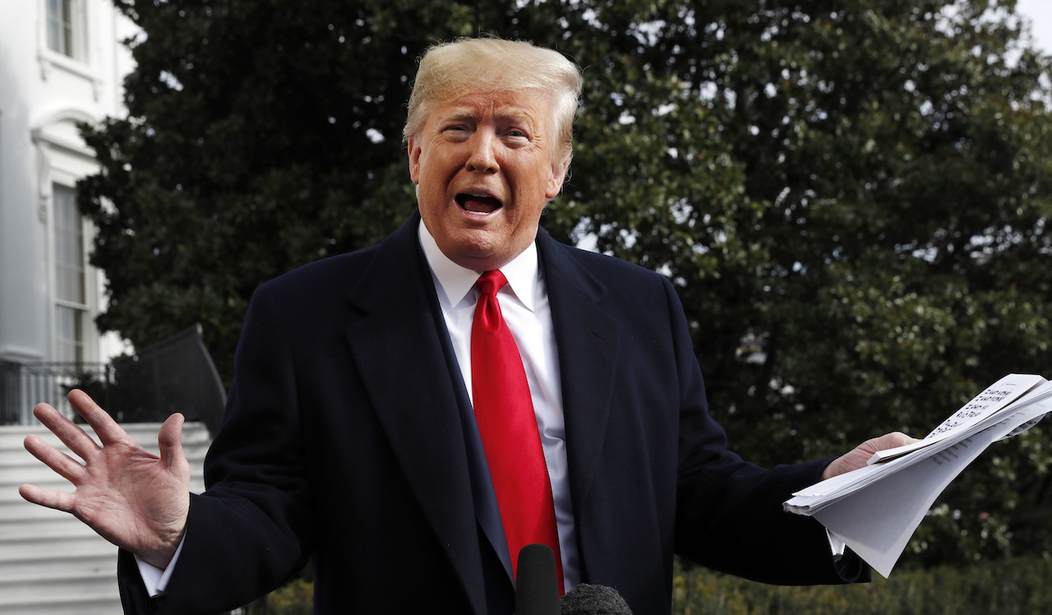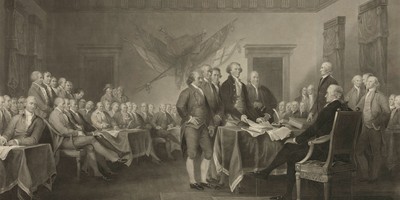As negotiations with China over a “phase one” trade deal continue, the critical 15% December 15th tariffs on about $165 billion of Chinese imports (covering products like iPhones, apparel, and toys) near. While it certainly seems financial markets are rooting for President Trump to postpone the tariffs, this ongoing conflict with China is more important than a few Dow points. And despite all the doomsday proclamations, the stock market is near an all-time high while over $350 billion of Chinese imports face tariffs. That is why Trump should feel no pressure to strike a deal and should implement these tariffs.
Ultimately, the party that holds more leverage in a negotiation can extract better concessions. Fortunately, America’s robust economy gives us the upper hand. Unemployment is at 3.5%, 1% lower than where the Federal Reserve predicted it would be today in its official forecast after Trump was elected (equating to over 1.7 million additional jobs). We have created over 200,000 new manufacturing jobs since implementing the first China tariffs. Middle-class wage growth is running at a cycle-high of 3.7%, and lower interest rates have pushed up housing activity over 5%. The US continues to defy the naysayers—Apple’s CEO even called ours the “strongest economy in the world.”
Conversely, fixed investment in China is running at the slowest pace 20+ years while auto sales have been falling every month since June 2018—the month Trump first formalized tariffs on Chinese exports. After posting their first decline since the 1990s in 2018, auto sales are set to run even lower in 2019. China has even suffered a string of bank failures. After enjoying two decades of strong growth, the Chinese economy has slowed mightily.
This weakness can be tied to our tariffs. In October, US imports from China were down 23%, and they have been declining at an accelerating pace all of 2019. Companies like Dell, Craftsmen, and William Sonoma are just a handful of many moving productions out of China to other Asian nations and back into the United States, pressuring China’s economy while insulating ours from the impact of tariffs. Indeed, at 1.6%, core inflation is running lower today than when the China tariffs were announced (2.0% in June 2018), so tariffs are not raising prices for American consumers.
Combine our relative economic strength with the fact that the swine flu has eradicated 1/3 of China’s hog population, which will force them to buy more US protein irrespective of the trade situation, and it’s clear we have the advantage. Importantly, our leverage will only grow over time. To the extent tariffs hurt growth, it is due to the fact that uncertainty causes businesses to defer investment. In this way, the ongoing trade talks are actually a detriment to growth because companies delay supply chain relocation in case a deal is struck that would remove the tariffs.
So the longer the tariffs remain in place, increasing the perception they are a permanent policy, the greater the push for companies to move production away from China, further weakening their manufacturing sector while increasing re-shoring activity here at home. By waiting to strike a deal, our leverage increases, allowing Trump to extract more concessions from China.
Additionally, we must recognize this conflict is about more than just the trade deficit. This is about diversifying our economy away from an ascendant power with malicious intentions. Under President Xi, China has not only put 1 million Uighur Muslims in concentration camps; it has harvested their organs. We have seen Xi attempt to break the “one nation, two system” agreement in Hong Kong, and for years, China has flouted international law, building military islands throughout the South China Sea (where over $3 trillion of trade flows) to take about 1 million square miles of international waters, bullying neighbors like Vietnam and the Philippines. Given the constant focus on Russian election interference, it’s remarkable how little sanction or criticism China has faced for hacking into OPM and stealing over 20 million records, including the information of many with national security clearances. As Xi has methodically trampled on the rights of his own people, it’s clear his ambitions have moved externally.
We need to ask ourselves: How much trade do we really want to do with China? For two decades, our trade deficits have helped fund their economic and military rise. Does continuing to do so really serve our national interest? Are we certain that China would never weaponize its supply chain in a broader geopolitical confrontation with the United States? 97% of antibiotics come from China, not to mention the rare-earth metals needed to make US fighter jets. It’s one thing to be economically dependent on an ally; it’s another to be dependent on a foe whose government subscribes to the mantra that “might is right” rather than valuing a government of, for, and by the people.
The Cuban Missile Crisis was one of the most fraught moments of the Cold War. Imagine though if the US economy was dependent on imports from the Soviet Union, which could have ceased shipments in response to our blockade of Cuba. How would that crisis have ended? Because America realized the Soviets were not a reliable partner, we never allowed our economy to rely on theirs. From oppressing and murdering his people to flouting international law, stealing our intellectual property, and hacking into our systems, Xi has proven China will not be a reliable partner in the 21st century—a modern-day Soviet Union.
As such, continuing to tariff Chinese products is essential to our long-term national security, even if there were to be some near-term economic costs. Diversifying, if not decoupling, our supply chains away from China is worth a few Dow points. We are merely fighting back against a sustained campaign of economic aggression to ensure America will never be vulnerable to Chinese aggression of any kind.
Irrespective of the pleading of many on Wall Street, President Trump should hold firm on China. Given the relative trajectory of our economies, patience will only give us more leverage to strike a deal on our terms, and tariff permanence is critical to diversifying our economy away from China to safeguard our national and economic security and prevail in this second Cold War.

























Join the conversation as a VIP Member